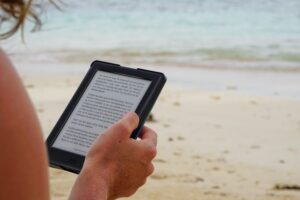June Pro Roundup: Beach Reads That Will Enhance Your Volunteer Management Practices & Leadership Chops
Who knew your summer reading could also strengthen your leadership skills and boost your volunteer management practices? No, not with boring texts, with inspired reads that can help us all become a better version of ourselves.
In my part of the world (Michigan, USA) we’ve been experiencing an unusually warm Spring, which has me thinking about the lazy days of summer and how I can fill my down time with some beach reads.
Now, I’m not thinking of your typical beach read! I’m looking for books that will enhance my work skills.
So, in this Roundup I am sharing some books that will help you too!
The Tipping Point:
How Little Things Can Make a Big Difference
– Malcolm Gladwell
The Tipping Point is Gladwell’s debut novel, and one very well known.
If you haven’t read it already, it’s likely you’ve at least heard about it and know the key concepts Gladwell teaches in his writing. In summary, this book teaches the following:
- Ideas can and will spread like fire – IF they reach the tipping point!
- You need three kinds of people to get to the tipping point – connectors, salesman, and mavens.
- Your idea needs to be “sticky” or memorable to catch on.
So, how can you incorporate these lessons into your volunteer management practices?
- The tipping point is when your idea goes from a nice to have for a few, to a need to have for many. If you are trying to ignite change at your organization, your message and behaviors are extremely important. You will want to build fast-moving momentum so it’s important to stay on top of your communications.
- Brainstorm a few key people in each category that can help you reach the tipping point. Your connectors will be the social butterflies, they are the ones who can effortlessly work to bring people together. Your mavens will be your trusted leaders, their opinions will greatly influence the many. Your salesman will be your biggest cheerleaders! They will sing your praises loud and proud and get people excited about your idea(s).
- Make sure what you are offering is something people really want. No matter how great your idea is, it won’t stick if no one is fully invested! Not sure what volunteers want? Ask them!
The Art of Gathering:
How We Meet and Why It Matters
– Priya Parker
A large majority of our lives are spent gathering, from team meetings, to dinner out with friends and family, to book clubs (or running clubs, knitting circles, etc.), most notably for volunteers, volunteer appreciation events!
However, when we think about this kind of gathering, we tend to focus on the details that don’t hold a candle to the true meaning of why we are gathering. The food, the decorations, the giveaways, etc.
It’s uncommon for a gathering to be designed to encourage human connections, which is the whole point of engaging volunteers, right?
So, in order to create memorable experiences for your volunteers, The Art of Gathering asks you to consider some of these big takeaways:
- Consider your true purpose for volunteer events and gatherings (include both formal appreciation events, informal get-togethers, orientations, and meetings). An easy way to lead with purpose? Start with thinking about the WHY versus the WHAT. Once you have your purpose in place, you’ll be able to organize the entire gathering with it in mind.
- Have a plan! Don’t just think that the gathering is enough. You need something for your guests to do before or after the awards are handed out, or all the coffee and donuts are gone, as the host needs to facilitate that activity. A well-planned event is far more enjoyable than something that was just thrown together with little thought.
- Bring authenticity to your gatherings. What’s a good indicator that something is authentic? Emotion. Always share stories at every single gathering you host with your volunteer or potential volunteers.
Atomic Habits
– James Clear
If you are struggling with building healthy habits (either at work or in your personal life) that can influence your life in a positive way, this is a great book for you!
What are habits and how do they affect your daily life?
Habits are the decisions you make and the actions you take, every single day of your life. Your habits set your life up for success/failure, happiness/unhappiness, healthy/unhealthy, etc.
To have a positive impact on your success at work, you need to form healthy habits.
Building healthy habits takes time and effort if you are looking to create lasting change. Read on for tips from James Clear, an international expert in forming habits that stick for continuous improvement.
To become more successful in life, there are three things you need to do concerning your habits:
#1 Form better habits
#2 Break bad habits
#3 Make your habits stick
Once you master these three areas, you will be able to design the life you want and work smarter, not harder, towards meeting your volunteer program goals.
Want a simple way to start weaving better habits into your volunteer management practices? Get a habit tracker!
Habit formation is not going to happen overnight. Keeping a habit tracker will help you visualize your progress and help you see where you might be stumbling.
Social Chemistry:
Decoding the Patterns of Human Connection
– Marissa King
Most people hate networking; however, as a leader of volunteers it’s a necessary skill to develop!
Building a thriving community of volunteers who are ready to jump in and answer your calls for support is all about building relationships. But what if you struggle in this area?
In this book you will learn how to network so that it doesn’t feel like a chore.
According to the author, there are three networking styles:
- An expansionist: They make networking look easy! People naturally gravitate towards them and they have an address book chock full of contacts.
- A broker: Brokers are natural connectors. Their network is diverse and they know how to bridge the gap between two people who seemingly would have nothing in common. For example, a volunteer manager and a software developer.
- A convenor: Convenors are all about building deep relationships with their contacts. Their network is likely composed of close friends who share the same values. Convenors easily build trust and value within their network.
Every networking style has its benefits and knowing which one you are can help you build a network of authentic connections. In this book, you will also learn how to overcome the disadvantages of each networking style.
The key message? If you want to up your networking game, take a page from each of the networking styles and create a style that is uniquely you!
The Obstacle is the Way:
The Timeless Art of Turning Trials into Triumph
– Ryan Holiday
I’m not sure this needs to be said again, but the last year has brought with it A LOT of challenges.
What do most people do when they are faced with challenges? They change their path, or they give in.
This book shows you how you can tackle challenges head-on, instead of tiptoeing delicately around them.
The author suggests mastering three things to turn an obstacle into an opportunity:
#1 Focus on your perception of the obstacle. It’s like looking for the silver lining, or the rainbow at the end of the storm. If you view the obstacle in a different light, you’ll be able to see some of the possibilities. For example, volunteer managers didn’t just give up when the pandemic shut down in-person volunteering. They got creative and built a virtual volunteer program from the ground up!
#2 Respond with action. When staring down the face of an obstacle, be creative and flexible. Are you having a difficult time getting your boss to approve a resource request for your volunteer program? Get creative with the resources you have at your disposal and remain flexible enough to change the terms of your request. Maybe they can’t approve the top-of-the-line volunteer management software that can do everything you want and more, but they can approve the software that does everything you need.
#3 Persevere and overcome. If you don’t believe in yourself, no amount of seeing an obstacle objectively and taking action against it will help you overcome. Your will helps you recognize what you can change and control, and what you cannot. Another way to think about this is to consider your big why. Why are you working to overcome a certain challenge? This outcome will drive you to succeed.
Chatter: The Voice in Our Head,
Why it Matters, and How to Harness It
– Ethan Kross
If you have been following VolunteerPro for a while, you know that we are big advocates of developing a healthy mindset.
We even have a free worksheet that can help you out with it!
We humans spend a third of our lives listening to our self-talk, so we need to ensure it is working for us, not against us!
In this book you will learn how to stop negative self-talk (referred to as chatter) and use it as a tool to help versus hinder your plans for the future.
To succeed in this, you need to know how to do three things:
1. Distance yourself from your chatter. Chatter causes you to zoom in on the dilemma at hand. Being completely consumed by a problem leads to depression and anxiety and impacts pretty soon you’ve lost the ability to think clearly. The author provides an easy technique to work with called temporal distancing.
Volunteer management can come with a lot of stress-inducing deadlines. If you are in the midst of a big project and you are having a difficult time keeping negativity over your ability to get it done at bay, consider how little this moment in time will matter in ten years. While your work is important and it matters, this technique will help you step out of your on-track focused mind and see the bigger picture!
2. Set aside time to recharge. In this book, the author refers to studies that show how important of a role nature has on our ability to focus and think positively. Other studies referenced shows that exposure to green space leads to more happiness.
So, start engaging with nature in whatever form you prefer! Take in a sunrise or sunset, grab your laptop and head outside for your next Zoom meeting, take a hike in the woods, plant your feet firmly in the ground, sand, or water. All these tactics can help you reduce chatter.
3. Seek help when needed. Find the right kind of support in your colleagues, family, and friends when you can’t seem to get out of your head.
What is the right kind of support? Look for people who will help you find solutions to the problem you are having, not people who want to focus solely on the problem. Also, consider who you are talking to! Your boss might not be the best person to help you solve a family issue.
Hungry for More Reads that can Improve Your Volunteer Management Practices?
If I buckle down and power through, I can typically get through one book in about 7-10 days.
If you’re the same way and want to devour more books this summer, you can check these out as well!
- How We Show Up, Reclaiming Family, Friendship, and Community – Mia Birdsong
- Building a StoryBrand: Clarify Your Message so Customers Will Listen – Donald Miller
- Dare to Lead: Brave Work. Tough Conversations. Whole Hearts. – Brené Brown
- You’re Invited: The Art and Science of Cultivating Influence – Jon Levy
- Get Together: How to Build a Community With Your People – Bailey Richardson
- You Are a Badass at Making Money: Master the Mindset of Wealth – Jen Sincero
- How to Be a Great Boss – Gino Wickman and René Boer
Have you read any of the books we highlighted?
Did we leave one of your favorites out? Let us know in the comments!
Happy reading!










